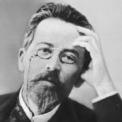Saturday, August 4: Mystery Masterclass
For our first ever Agony Aunt column, we welcome Anton Chekhov, perhaps the greatest short story author of all time.
ASK ANTON
by Anton Chekhov
Dear Anton,
How do you effectively evoke pity from the reader?
Candace J., Bayonne, NJ
When you describe the miserable and unfortunate, and want to make the reader feel pity, try to be somewhat colder — that seems to give a kind of background to another’s grief, against which it stands out more clearly. The more objective you are, the stronger will be the impression you make. –Anton
Dear Anton,
Do you have any advice regarding murder weapons? How technically detailed should you get?
Andrew S., Mayport, FL
If there is a gun hanging on the wall in the first act, it must fire in the last.
Another piece of advice: when you read proof, cross out as many adjectives and adverbs as you can. It is comprehensible when I write: “The man sat on the grass,” because it is clear and does not detain one’s attention. On the other hand, it is difficult to figure out and hard on the brain if I write: “The tall, narrow-chested man of medium height and with a red beard sat down on the green grass that had already been trampled down by the pedestrians, sat down silently, looking around timidly and fearfully.” The brain can’t grasp all that at once, and art must be grasped at once, instantaneously. –Anton
Dear Anton,
Dutch Leonard says you should never start a story with the weather. Have you anything to add?
Belinda R., Waxahachie, TX
Descriptions of nature should be very short and always be à propos. Commonplaces like “The setting sun, sinking into the waves of the darkening sea, cast its purple gold rays, etc.”, “Swallows, flitting over the surface of the water, twittered gaily” — eliminate such commonplaces. You have to choose small details in describing nature, grouping them in such a way that if you close your eyes after reading it you can picture the whole thing. For example, you’ll get a picture of a moonlit night if you write that on the dam of the mill a piece of broken bottle flashed like a bright star and the black shadow of a dog or a wolf rolled by like a ball, etc. . . . In the realm of psychology you also need details. God preserve you from commonplaces. Best of all, shun all descriptions of the characters’ spiritual state. You must try to have that state emerge clearly from their actions. Don’t try for too many characters. The center of gravity should reside in two: he and she. –Anton
Dear Anton,
Harlan Ellison describes the occupation of writer of fiction as being a “paid liar”. Do you agree?
Melchior K., Eureka, CA
One has to write what one sees, what one feels, truthfully, sincerely. I am often asked what it was that I was wanting to say in this or that story. To these questions I never have any answer. There is nothing I want to say. My concern is to write, not to teach! And I can write about anything you like. … Tell me to write about this bottle, and I will give you a story entitled “The Bottle.” Living truthful images generate thought, but thought cannot create an image. –Anton





















Damn, that’s good! This Tony Chekov guy has a great future in crime fiction.
==============
Detectives Beyond Borders
“Because Murder Is More Fun Away From Home”
http://www.detectivesbeyondborders.blogspot.com/
I dunno. He may be a one-trick pony. Only time will tell the tale.
HIs passage about weather reminded me of one of Mark Twain’s minor novels (The American Claimant?) which begins with a note to the effect that “this is an attempt to write a book without weather.” He explains that he has included an appendix with some of the best writing about weather and if, at any point you feel the need to know what the weather was like in the book, you can just flip to the back and pick a random passage. Of course, the last selection in the appendix was “It rained for forty days and forty nights.”
Oh, Anton, thank you for the clarity.
You have to choose small details in describing nature, grouping them in such a way that if you close your eyes after reading it you can picture the whole thing.
This is what I call “making the reader do the work”, i.e., providing just enough information so that the reader’s imagination takes over and fills in the gaps.
I’m not sure I agree entirely with Anton’s advice about the gun. Sometimes what’s important is simply the expectation that the gun will be fired, when it actually isn’t–in other words, the gun might be used for misdirection instead. The one thing you can’t do, of course, is ignore the gun entirely.